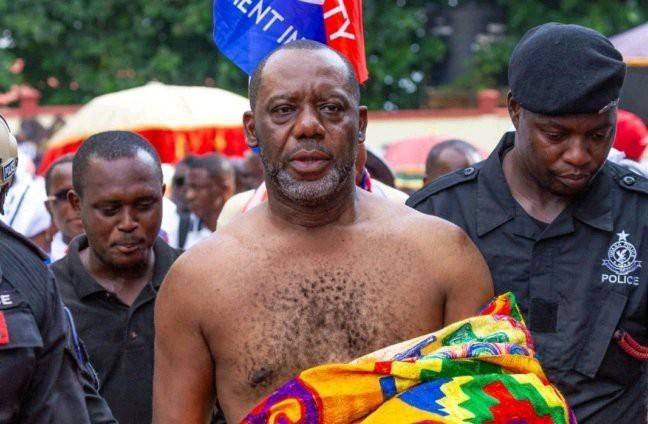Dr. Matthew Opoku Prempeh, popularly known as NAPO, the running mate of the New Patriotic Party (NPP), has found himself at the center of a heated controversy following remarks he made during a campaign event. The comment, which labeled voting for the National Democratic Congress (NDC) as "haram," has sparked widespread criticism from the Muslim community and ignited a national conversation about the intersection of religion and politics.
The term "haram," rooted in Islamic law, refers to acts that are prohibited or sinful. By using this word in a political context, NAPO has inadvertently stirred anger among Muslims, many of whom view the statement as inappropriate and offensive. This controversy has placed the NPP in a precarious position, forcing the party to address the fallout while continuing their campaign efforts.
### NAPO’s Campaign Strategy and the Backlash
As the December elections draw closer, the NPP has intensified its campaign activities, organizing rallies and engaging directly with constituents. Dr. Opoku Prempeh, known for his passionate speeches, has been a central figure in these efforts. His intent, it seems, was to appeal to the religious sensibilities of Ghana’s Muslim population, a significant voting bloc in the country.
However, his statement that “voting for the NDC as a Muslim is haram†has been met with strong disapproval. Critics argue that this rhetoric undermines the democratic principle of free choice and inappropriately uses religion to sway voters. Many within the Muslim community have expressed outrage, calling the remark divisive and disrespectful to their faith.
The backlash was swift, with social media platforms buzzing with reactions from both individuals and organizations. Prominent Muslim leaders and scholars have condemned the statement, urging politicians to avoid dragging religion into partisan politics.
### The Broader Implications of the Statement
This controversy has sparked a broader debate about the role of religion in Ghanaian politics. Ghana, a religiously diverse country, has long prided itself on peaceful coexistence among different faiths. However, moments like these expose the underlying tensions that can arise when religion and politics intersect.
For many, NAPO’s statement raises questions about the ethical boundaries political leaders should observe during campaigns. While politicians often use cultural and religious references to connect with voters, there is a fine line between fostering inclusivity and alienating certain groups.
The comment also highlights the challenges of navigating the complex relationship between democracy and religious doctrines. While democracy thrives on diversity of thought and opinion, religious principles often advocate specific moral codes. Balancing these two perspectives is a delicate task, especially in a multicultural and multi-religious society like Ghana.
### Efforts to Repair the Damage
In response to the uproar, the NPP has attempted to defuse the situation by clarifying NAPO’s remarks. Party representatives have emphasized that his intention was not to insult or marginalize any group but to encourage dialogue about shared values. Despite these efforts, the damage to the party’s relationship with the Muslim community may take time to mend.
NAPO himself has not yet issued a formal apology, which many see as a necessary step toward reconciliation. Political analysts warn that failure to adequately address the controversy could have serious repercussions for the NPP’s electoral prospects, particularly in regions with large Muslim populations.
Meanwhile, civil society organizations and religious leaders have called for greater sensitivity in political discourse. They argue that Ghana’s peace and stability depend on the ability of its leaders to unite, rather than divide, its people.
### Reactions from the Muslim Community
The statement has elicited a range of responses from Ghana’s Muslim population. Some see it as an isolated incident, while others view it as indicative of a larger problem: the tendency of some politicians to exploit religion for political gain.
“Using the word ‘haram’ in this context is deeply offensive,†said a prominent Islamic scholar. “It reduces our faith to a political tool, which is unacceptable.â€
Others have expressed concern about the potential long-term effects of such rhetoric. “We must be careful not to allow politics to drive a wedge between our communities,†one community leader remarked. “Our strength lies in our unity, and we must work to preserve it.â€
### The Way Forward
This incident serves as a reminder of the importance of thoughtful and respectful communication, particularly in a diverse society. Politicians must recognize the power of their words and the potential consequences of their actions.
As Ghana prepares for the upcoming elections, maintaining peace and fostering unity should be top priorities for all stakeholders. This includes political parties, religious leaders, and voters themselves.
While the controversy surrounding NAPO’s remarks may fade with time, it has left an indelible mark on the nation’s political landscape. It is a lesson in the need for balance, sensitivity, and respect in all aspects of governance and public discourse.
In the end, the true test of leadership lies in the ability to bring people together, rather than drive them apart. The hope is that this incident will serve as a catalyst for greater understanding and cooperation among Ghana’s diverse communities, ensuring that the nation’s democracy continues to thrive.


